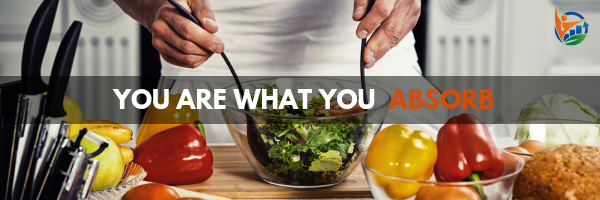“You are what you eat. Choose wisely.”
Have you heard that one before? Unfortunately, it’s not that simple. In fact, nutrient dense food could be HARMING your body and increasing your toxic load, leading to physical and mental sluggishness.
I frequently work with clients who are eating a good and sometimes great diet. However, despite their healthy food choices, they are plagued with symptoms such as…
- Poor energy during workouts
- An inability to drop unwanted weight
- Unpleasant digestive problem
Why?
Absorption Matters
You are what you ABSORB. Food quality is definitely important, but how well food is digested impacts whether it will provide a boost for the body or be a burden.
If your digestive system is malfunctioning, three main problems can occur:
PROBLEM #1: The food you are ingesting won’t be broken down properly. Therefore, necessary nutrient absorption won’t happen. Healthy, well-nourished cells are the foundation of a healthy body and vice versa. When easily absorbable nutrients aren’t being delivered to your cells, a host of health problems ensues.
PROBLEM #2: If food only gets partially digested, carbohydrates will start to ferment, proteins will putrefy, and fats will turn rancid in your gut. This leads to autointoxication, which is a huge burden on the body. The resulting symptoms are often inflammation (e.g. joint pain), digestive discomfort, and foul flatulence just to name a few.
PROBLEM #3: Partially digested food feeds bad bacteria in the intestines. An overgrowth of those bad gut bugs greatly hampers your immune system, decreases energy, increases your sugar cravings, and leads to brain fog.
Do you enjoy being sick, tired, at the mercy of your sugar cravings, and unproductive? No? Me neither. Read on for some solutions.

Optimizing Digestion
Digestion is a north to south process. If the more northern parts of the digestive system are malfunctioning, it will negatively impact all digestive organs south of that particular organ.
Get to the Root
Where does digestion begin?
Did you guess the mouth? Close but no cigar.
Digestion begins in the brain. Imagine a lavish holiday meal is spread before you. The aroma of food fills the air. Before you even put a morsel into your mouth, you see and smell the food, triggering the brain to cause your mouth to “water” with salivary amylase. Simultaneously, your stomach is triggered. In preparation for the food, digestive juices release.
In order for these important physiological triggers to occur, YOU MUST BE RELAXED WHILE YOU EAT. When your body and mind are at rest, you are better able to digest food.
Conversely, if your body or mind is stressed in any way, the brain registers that there is some external source of stress that must be dealt with immediately. Digestion is put on the back burner.
Stress and Your Gut
Traditionally, overcoming exterior threats to an individual’s well-being necessitated the use of large muscle groups. For example, if your ancestor encountered an attacking saber-toothed tiger, his body would have sent blood away from the digestive organs and toward large muscles so he could more effectively fight or flee.
Our stress response still follows these primitive cause-and-effect patterns. Therefore, when there is a perceived stress, whether great or small, your body sends blood and attention away from the digestive system and toward the large muscle groups. In that moment of stress, your body prioritizes survival over digestion.
So what activities negatively impact the initial stage (and consequently all stages) of digestion? Here are just a few examples:
- Eating in the car.
- Inhaling food while reading stressful e-mails at work.
- Multitasking during a meal.
- Munching down while watching negative news or viewing an action packed show or movie that gets your adrenaline pumping.
- Eating while having a (negative) emotionally charged conversation.
Action Steps
Implement the following steps to help optimize your digestion, and in turn, level up your body and brain’s performance.
- Take a deep breath before eating.
- (Mentally) rest to digest.
- Focus on your food. Enjoy each bite.
- Eat with an attitude of gratitude.

Leave Your Comments
blog comments powered by Disqus